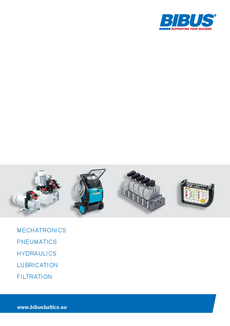
BIBUS Baltics has developed and launched a hydraulics training course, in which theoretical knowledge is strengthened with the practical part.
The training is relevant for technical staff and engineers in any company who deal with hydraulics on a daily basis.
The training program is adapted to the specifics of each customer's activity, focusing on the topics that are relevant to the customer.
The training will give you:
Understanding of the operating principles of hydraulic equipment and their constructions, thus the ability to assess their operation and technical condition
Ability to read schemes of hydraulic equipment and recognize their components, understand their operating principles
Perform simple parameter calculations of hydraulic equipment components
Understanding of work safety procedures when working with hydraulic equipment
Basic skills in finding defects in hydraulic equipment
Skills in creating simple hydro equipment schemes and selecting components
Why is training relevant?
Technical personnel must be properly trained to work with, repair and maintain the equipment.
Equipment that receives proper care will run more smoothly, making maintenance more efficient and improving productivity.
Why is training still important?
Because it saves time and money.
A trained technician not only knows how to read equipment schematics and carry out repairs, but also knows how to carry out repairs in the shortest possible time with minimal expenses for the procurement of parts.
This means less equipment downtime and a higher return on investment for the company. Only personnel who understand the equipment and components they work with can implement improvements in their work and make it more efficient!
List of main training topics:
Day 1
INTRODUCTION and THEORY
1. Basic operating principles of drive systems/comparison
• Hydraulics
• Pneumatics
• Electromechanics
2. Fluid flow theory
• Work
• Flow
• Change in pressure
• Properties of liquids
3. Types of hydro systems
• Open loop systems (open-loop hydraulic circuit)
• Closed-loop hydraulic circuit systems
MAIN PART: COMPONENTS, MARKING, MEASUREMENTS, CLANLINESS, SCHEMES
1. Components of hydraulic systems (>>> course length 4...6 h<<<)
• Tanks
• Valves – types and principles of operation
• Pumps – types and principles of operation
• Executive elements – motors and cylinders
• Filters – types and classification
• Heat exchangers – types and operating principles
• Control elements and types of hydraulic systems
2. Cleanliness, Measurements, Schemes (>>> course length 1.5...3 h <<<)
• Filtration – pollution and its effects in hydraulic systems, cleanliness classes
• Measurement – instantaneous and average values – pressure measurements, temperature, flow
• Determination of oil condition
Day 2
1. Defects of hydraulic systems, detection
2. Schematics, drawing, tools, programs
3. Lubrication of mechanisms
a. Why is lubrication necessary?
b. Types of lubrication
c. Basic elements
4. Practical task: manipulator
a. Understanding of the technical task, preparation
b. Calculations
c. Selection of components, justification
d. Drawing up a solution, discussing the details
5. Knowledge test (30 min)
The venue of the training can be at your premises, or at BIBUS Baltics (available for small groups). For larger groups, this is also an option, but must be arranged separately.
Both training days can be organized one after the other or after a certain time.
The training was developed and conducted by BIBUS Baltics Hydraulics Manager Kalvis Kravalis: kka@bibusbaltics.eu

